With the rise of the raucous, raunchy, male-dominated Underground Comix scene of the 1960s and ’70s — itself a backlash against the sanitized books that passed Comics Code Authority muster — came another backlash of sorts, from women galvanized by the feminist movement and looking to tell their own stories about heretofore taboo topics, including sexuality, sexism, and reproductive rights. On this final day of Women’s History Month 2017, we present a brief history-in-images of women in the Underground Comix movement.
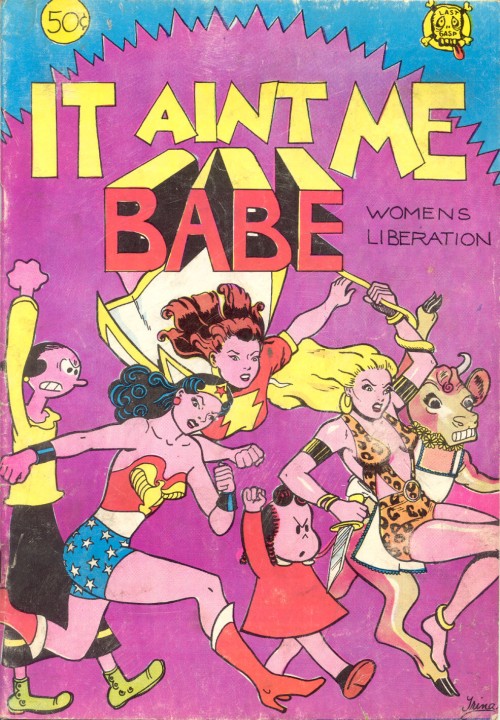
Image from Women in Comics wiki.
The first all-women underground publication was the 1970 one-shot It Ain’t Me Babe, edited by Trina Robbins and Willy Mendes. Published by Ron Turner’s Last Gasp, the comic featured stories by Robbins and Mendes as well as Nancy Kalish, Meredith Kurtzman, Michele Brand, Lisa Lyons, and Carole. Although copies are hard to come by today, the book sold well enough that Turner agreed to an all-female series, Wimmen’s Comix, which launched in November 1972 as a collective with rotating editorship.
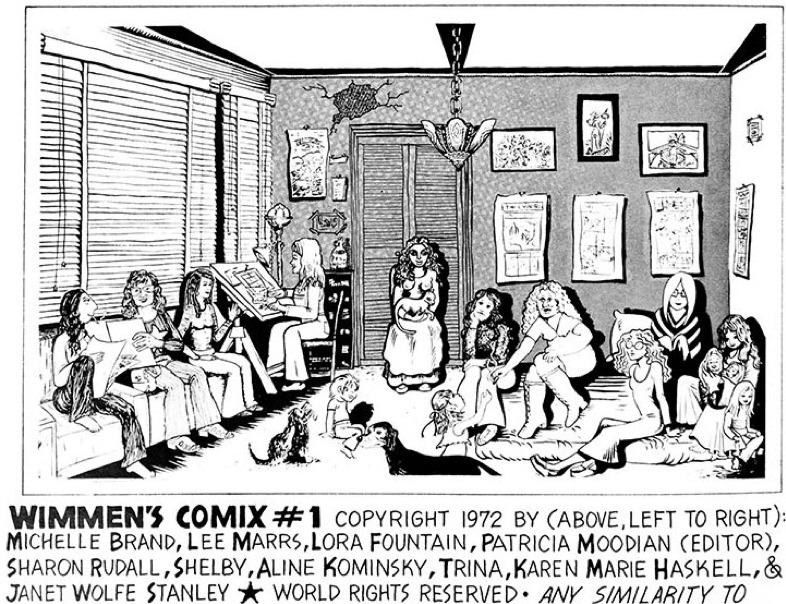
Group self-portraits from Wimmen’s Comix #1. Image from KQED.
From the start, Wimmen’s Comix deconstructed the sexist double standards applied to women in a quickly changing society, here depicted by Lee Marrs:
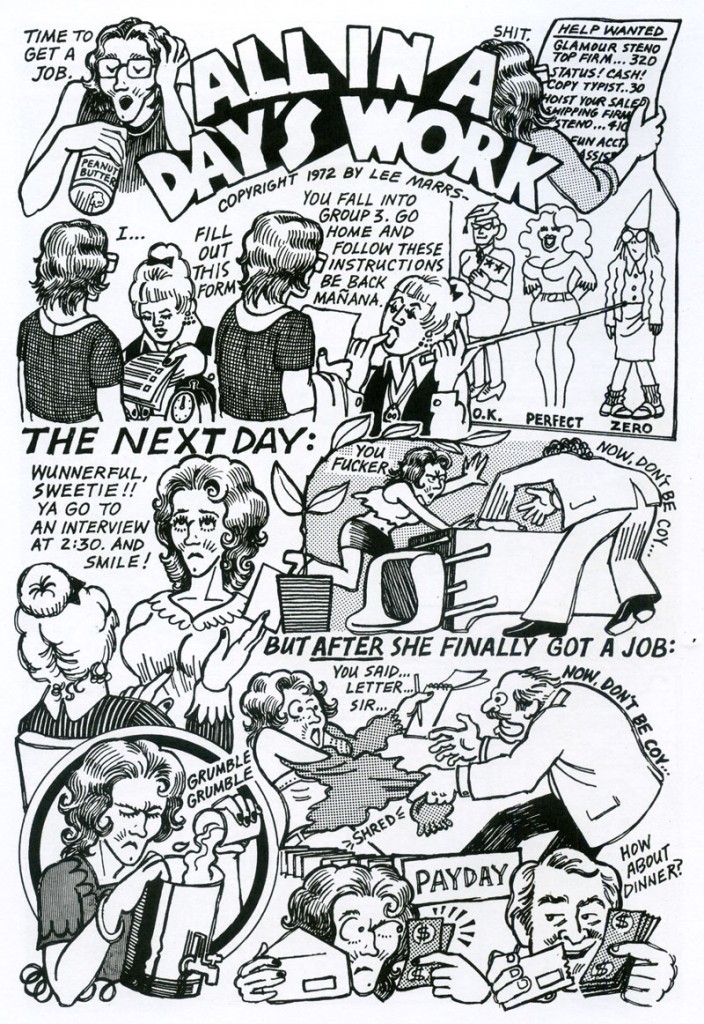
“All In a Day’s Work” by Lee Marrs from Wimmen’s Comix #1. Image from KQED.
The collaborators also expanded the discussion of women’s sexuality with honest and personal explorations of all orientations, as shown here by Robbins:
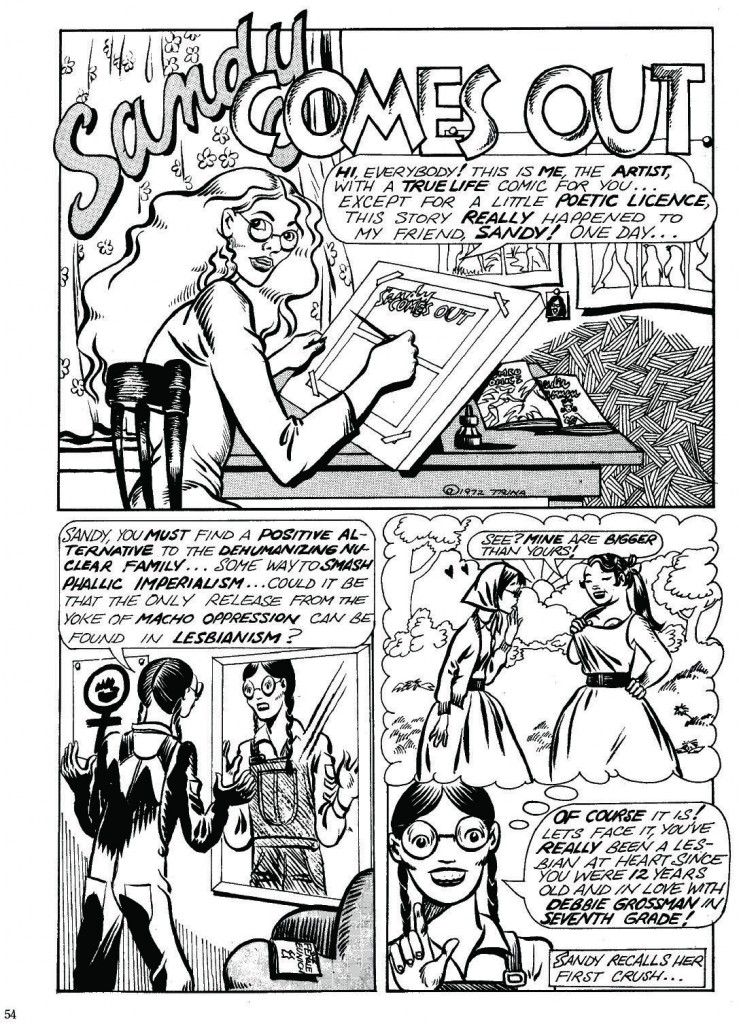
“Sandy Comes Out” by Trina Robbins in Wimmen’s Comix #1. Image from AutoStraddle.
Beauty standards and body image were also frequent topics, as in “Goldie” by Aline Kominsky.
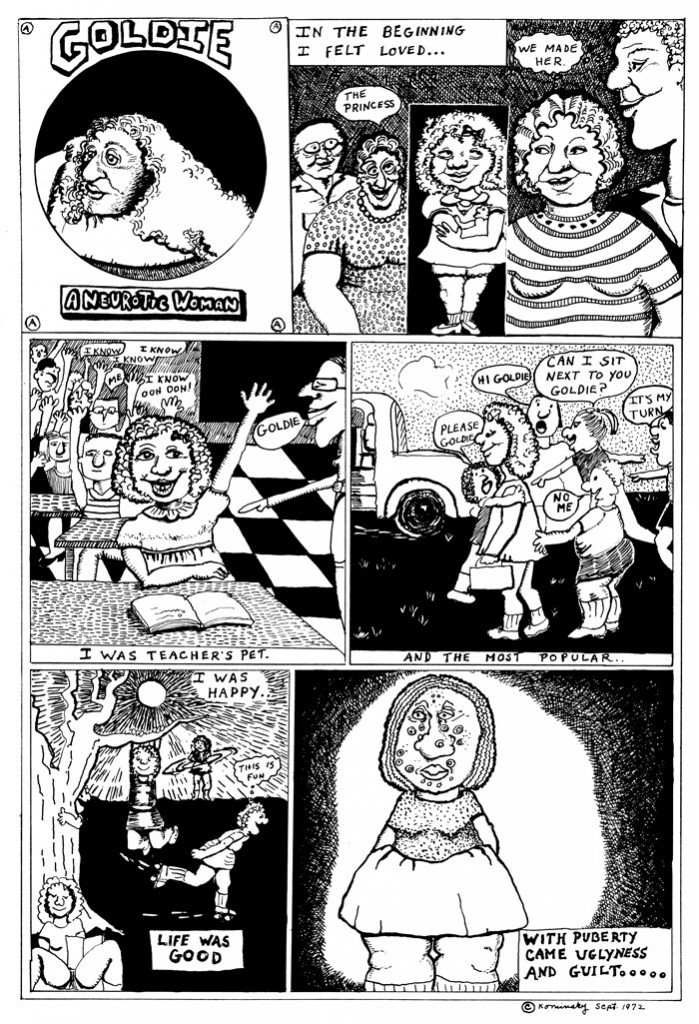
“Goldie: A Neurotic Woman” by Aline Kominsky in Wimmen’s Comix #1. Image from The Comics Journal.
Wimmen’s Comix endured with an irregular publishing schedule until 1992, later featuring landmark creators, including Melinda Gebbie, Phoebe Gloeckner, Roberta Gregory, Shary Flenniken, Dori Seda, Diane Noomin, and many more.
A few months before the founding of Wimmen’s Comix, Joyce Farmer (then Sutton) and Lyn Chevli founded their own series Tits & Clits Comix in July 1972, self-published under the Nanny Goat Productions banner. The first few issues exclusively featured work by Farmer and Chevli, like this parody ad from the back cover of #3:
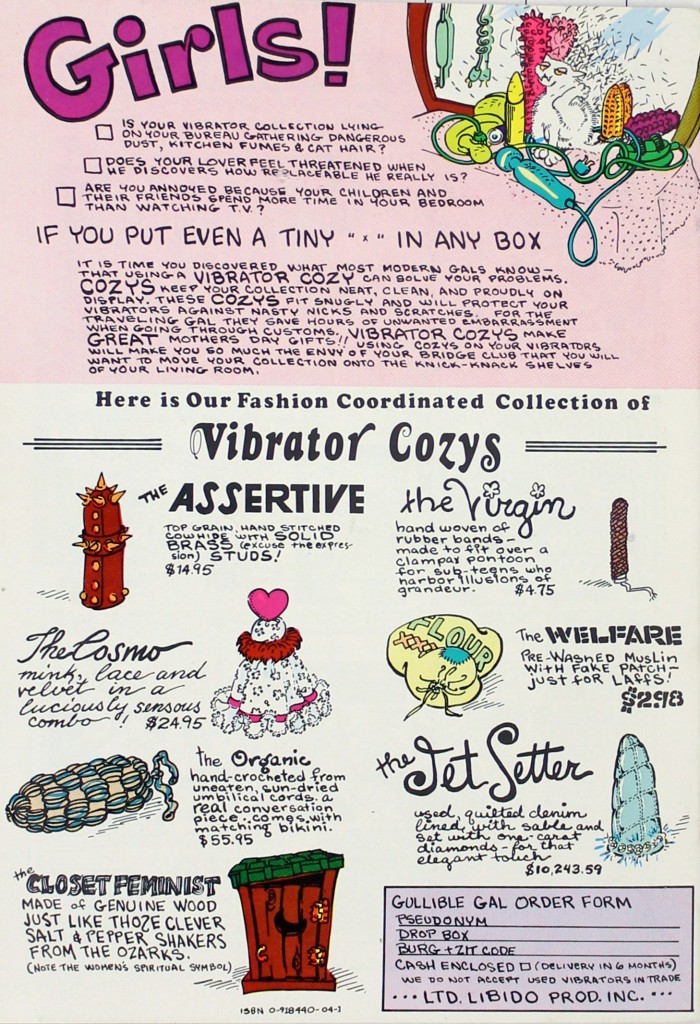
Joyce Farmer parody ad from Tits & Clits Comix #3. Image from Pride Library.
Feeling that the title itself limited distribution of the book and also risked being judged obscene in court, Farmer and Chevli published one issue that was instead titled Pandoras Box. The title may have changed, but the content was no less groundbreaking:
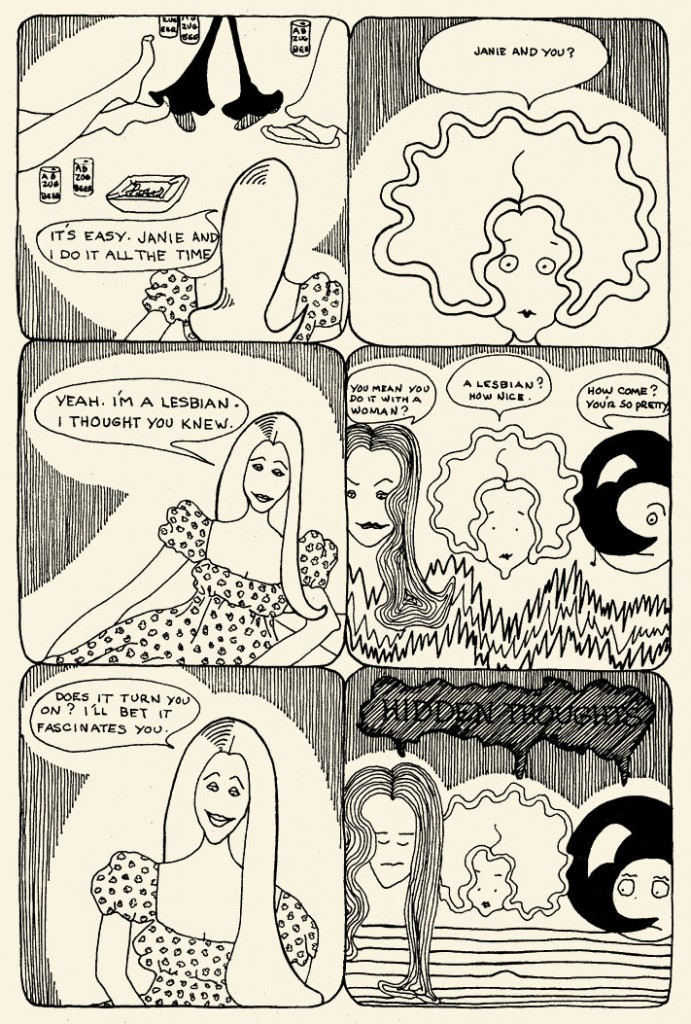
From Pandoras Box #1 by Lyn Chevli and Joyce Farmer. Image from ComixJoint.
Subsequently though, the two returned to the Tits & Clits title, picking up with #2 in 1976. The final four issues were also published by Last Gasp intermittently between 1977 and 1987.
Farmer and Chevli also produced the 1973 one-shot Abortion Eve following the Supreme Court’s decision in Roe v. Wade. At the time, both women were working as pregnancy counselors and wanted to help dispel abortion myths and provide matter-of-fact information about the procedure. The book’s cover promises “a discussion about the legality of abortion, what to expect during an abortion, head trips — before and after, and much more….”
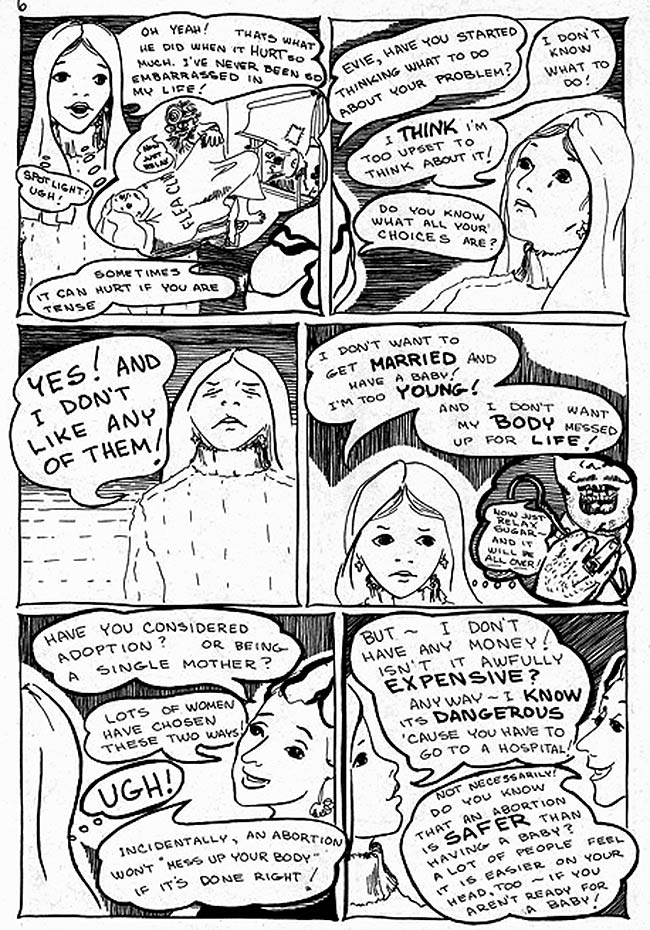
From Abortion Eve by Lyn Chevli and Joyce Farmer. Image from The Comics Journal.
This is just the tip of the iceberg — many women contributed to Wimmen’s Comix and got their start in Undergrounds. For more about women in Underground Comix as well as other eras of sequential art, check out She Changed Comics, which includes profiles of more than 60 groundbreaking female professionals. Additionally, Trina Robbins is not only an accomplished creator in her own right, but an assiduous historian of women in the field. Among her benchmark histories of women in comics is Pretty in Ink: North American Women Cartoonists 1896-2013.
Help support CBLDF’s important First Amendment work in 2017 by visiting the Rewards Zone, making a donation, or becoming a member of CBLDF!
Contributing Editor Maren Williams is a reference librarian who enjoys free speech and rescue dogs.